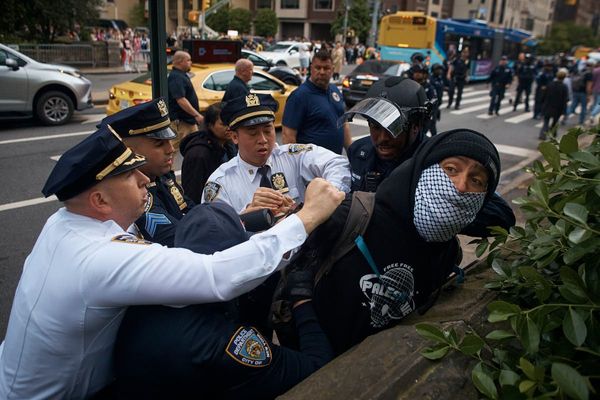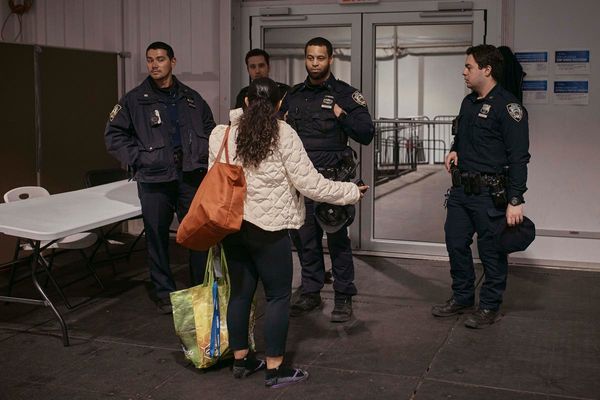
Last month, the US musician Santigold published a long statement to social media announcing the cancellation of her upcoming Holified tour. “As a touring musician, I don’t think anyone anticipated the new reality that awaited us [after the pandemic],” she wrote, citing two years of no income; the skyrocketing cost of gas, flights, and hotels; a flooded market of delayed tours, leading to overbooked venues and audiences; and the risk of infection, alongside general exhaustion and poor mental health.
“I think it’s important for people to know the truth of what it’s like out here for artists,” she continued, “and I don’t believe enough of us are talking about it publicly.”
I am so sorry to announce the cancellation of my Holified Tour. Please read the letter attached or click the link below to read the full letter with details of this announcement. https://t.co/nAnwbQzkN6 pic.twitter.com/9znOCQXK2i
— Santigold (@Santigold) September 27, 2022
Santigold isn’t alone. On 10 October, Animal Collective cancelled their UK and Europe tour, pointing to an “economic reality that simply does not work”. On 6 October, Sampa the Great announced she was rescheduling her forthcoming European shows, citing tour exhaustion and financial risks; a few days earlier, the Avalanches cancelled their remaining North American tour dates due to “serious illness”.
The month before, the UK rapper Stormzy nixed his upcoming Australia and New Zealand tour – a full three years after the original announcement; Justin Bieber once again postponed his world tour, citing health reasons; and Australian alt rockers Gang of Youths cancelled their upcoming North American dates, with their frontman, Dave Le’aupepe, writing in a statement: “I’m getting to the point where the stress of travel, illness and feeling constantly hampered by injuries and physical shit sustained on the road is taking a significant toll on my wellbeing overall.”
According to data from a survey by I Lost My Gig Australia, between 1 July and 31 August last year, 32,737 Australian gigs were cancelled – equating to nearly $94.3m in losses in just two months. That’s a huge blow for the contemporary music sector – a sector which Live Performance Australia found contributes most to the live performance market share, drawing $1.1bn in revenue in 2018.
But those two months measured by I Lost My Gig fell in the middle of a pandemic that had shut down most of the industry. More than a year later, we’re able to enjoy live music again – so why are so many musicians still cancelling their shows?
Expensive flights, cheap fees: the cost of touring
As the industry attempts to recover, a wealth of issues continue to wreak havoc on touring – and many of them are financial.
As a musician myself, I can say from experience that Australia has always been difficult to tour profitably. Starting out, you might be offered an opening slot on the national tour of a bigger artist – a vital way to expose your music to a wider audience, but not one that pays well (many support artists are paid as low as $100 a show). And to hit all the major cities, it’s virtually impossible to tour Australia by road – meaning you’ll need to buy flights for yourself, your band and in some cases your team and crew.
“There’s so much money that goes into it – and unless you have the means to fund a tour, and then potentially lose all that money, there’s no hope,” says Heather Riley, one half of Melbourne-based punk duo Cry Club. “Flights are so expensive at the moment. We can only do half tours if we get support slots, because we can’t afford to go to Perth.”
Festivals, too, are not immune to soaring costs, staffing issues, and low consumer confidence – not to mention the destruction wrought by climate change over the past few years.

Extreme weather events have caused the cancellations or postponements of at least nine major Australian music festivals in 2022, according to Sydney Morning Herald. This list includes Splendour in the Grass, This That and Strawberry Fields, resulting in loss of income not just for promoters but for thousands of artists, crew, stall holders and other personnel relying on the weekend of work.
And for artists, it’s not just about the loss of fees (which can be anything from a few hundred dollars to tens or hundreds of thousands); they also lose the audience reach a festival set can bring.
A cashflow problem – and a confidence problem too
While costs are rising, artist fees are not – and tickets to regular shows are harder to move than ever. Many fans aren’t ready to return to the crowded, sweaty mosh; others are dealing with the cost of living crisis. And with the exception of blockbuster shows, people who do buy tickets are tending to buy them last-minute – creating a cashflow problem for artists, and a confidence problem too.
“Because we don’t have as many people buying pre-sale tickets, we don’t have a clear understanding of how a show is going to perform,” says Shannen Egan, a Melbourne-based artist manager. “We’re looking at the numbers, we’re looking at the inflation of touring costs, and asking if this is really sustainable.”
After two years without audiences, bands don’t really know where they stand with their fans right now. A Melbourne band might have been able to sell out a 300-capacity room in Sydney at the end of 2019 – but after three years without a tour, how many tickets could they move now? And if people aren’t buying tickets in advance, you’re stuck guessing whether or not you’ll break even, which can lead to some devastating last-minute decisions. “If a venue is paying you a cut of ticket sales as opposed to a guarantee [flat rate], you’re absolutely more likely to pull the plug on a show if there’s less pre-sales,” says Riley, from Cry Club. “That can lose you a ton of money if you’re travelling interstate or overseas.”
I’m gonna say it:
— Alex Lahey (@AlexLahey) September 27, 2022
Despite the brave faces, the live music industry is FUCKED after Covid. Shit’s hard out here. If you can afford it, please buy tickets to shows. It really helps artists, musicians, crew members and all the people behind the scenes survive and stay in the game
During the height of the pandemic, the federal government’s jobkeeper and jobseeker schemes, state-based relief funds and industry body grants kept many music industry workers above the poverty line while touring was impossible. But now, the funds have finished, there’s still a lack of live performance insurance and we’re in the middle of an inflation crisis, with very little support available to those trying to navigate a damaged industry. And as the overwhelming majority of musicians and crew are contract workers, if a tour gets cancelled, no one gets paid.

To combat low artist fees that do not reflect the rising cost of living and of touring, a minimum wage for musicians has been put forward by Musicians Australia, a union for working musicians in Australia.
Paul Davies, director of musicians at Media, Entertainment and Arts Alliance and Musicians Australia, says that if the $250 minimum wage is not introduced and enforced, the industry “is based on exploiting musicians”.
“In the music industry, musicians are at the bottom of the supply chain. Without a minimum wage, unmanageable risks are shifted on to musicians.”
Last year, the upper house of the NSW parliament passed a resolution in favour of a $250 minimum fee for musicians playing at publicly funded events – a resolution that was already in place in Western Australia, South Australia and Queensland. The Victorian government’s Live Music Restart funding, meanwhile, was only distributed to venues and events paying musicians $250 a gig.
‘Don’t shame them for their honesty’
In May, the Swinburne University of Technology released a study surveying 1,300 people working in live performance and music. More than half of respondents had experienced suicidal thoughts – over four-and-a-half times the proportion of the general population – and more than one in ten of them had acted on them.
Nearly two in three reported high or very high levels of psychological distress, making it four times as common as in the general population. Among vulnerable groups, the proportion of highly stressed respondents was even worse: 83% of non-binary people, 72% of women, 75% of people under 35, 81% of people with a disability or long-term health condition and 81% of people on a very low income.
Damn if Animal Collective can’t even tour and make any profit…. This industry is broken. Pretty depressing. pic.twitter.com/ojdu0qQ6zC
— 🪄PICTUREPLANE🌙 (@pictureplane) October 10, 2022
Casey O’Shaughnessy, a booking agent at Australian company Select Music, believes audiences should try to be more understanding when artists cancel shows, particularly if they’re cancelling due to mental health reasons. “After the last couple of years, more than ever before, there is a willingness in the entertainment industry to speak about mental health struggles and the relentless demands of touring,” she says.
“If an artist does happen to postpone or cancel a tour – especially due to mental health struggles – don’t shame them for their honesty and humanity.”







